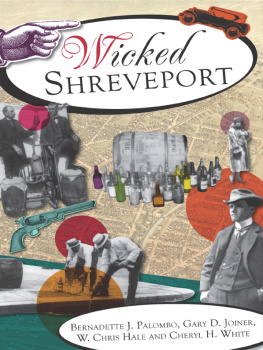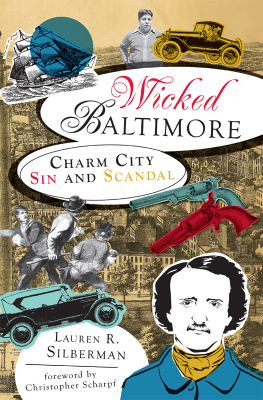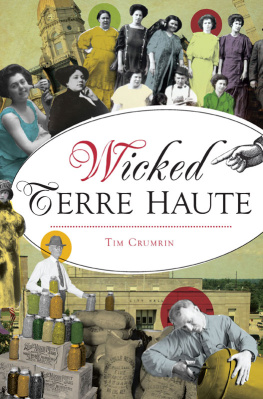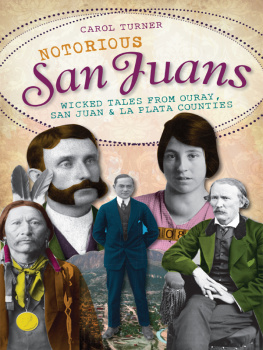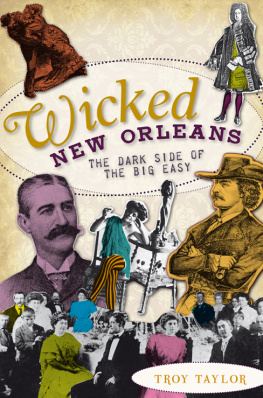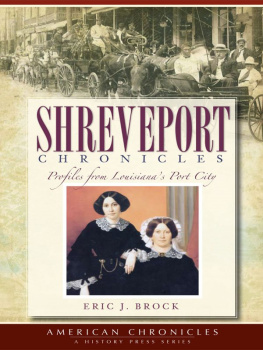

Published by The History Press
Charleston, SC 29403
www.historypress.net
Copyright 2012 by Bernadette J. Palombo, Gary D. Joiner,
W. Chris Hale and Cheryl H. White
All rights reserved
First published 2012
e-book edition 2012
ISBN 978.1.61423.366.4
Library of Congress Cataloging-in-Publication Data
Wicked Shreveport / Bernadette J. Palombo [et al.].
p. cm.
Includes bibliographical references.
print edition ISBN 978-1-59629-818-7
1. Crime--Louisiana--Shreveport--History. 2. Crime--Louisiana--Shreveport Region--History. 3. Corruption--Louisiana--Shreveport--History. 4. Scandals--Louisiana--Shreveport--History. 5. Criminals--Louisiana--Shreveport--Biography. 6. Shreveport (La.)--Social conditions. 7. Shreveport (La.)--History. 8. Shreveport (La.)--Biography. I.
Palombo, Bernadette Jones.
HV6795.S527W53 2012
364.10976399--dc23
2011052414
Notice: The information in this book is true and complete to the best of our knowledge. It is offered without guarantee on the part of the author or The History Press. The author and The History Press disclaim all liability in connection with the use of this book.
All rights reserved. No part of this book may be reproduced or transmitted in any form whatsoever without prior written permission from the publisher except in the case of brief quotations embodied in critical articles and reviews.
Contents
Acknowledgements
We wish to acknowledge the assistance of Dominica Carriere and Shawn Bohannon, curators at the Louisiana State University in Shreveport, Archives and Special Collections. Their expertise is unequalled. Joe Slattery, research librarian at Shreve Memorial Library, Broadmoor Branch provided valuable insight.
We also want to thank local historians Eric Brock, Clifton Cardin, John Andrew Prime and Mary Margaret Richard. They have been good friends and possess a vast array of knowledge on the history of our region.
Finally, during the course of writing this book, some of our students helped share the burdens of research. They made our tasks much easier. We will always be grateful to Sara Carpenter, Blake Lee, Laulie Pasquier, Elisha Scott and Laura Beeman.
1
Frontier Violence: Vengeance Is Mine
Gary D. Joiner, PhD
In those days a man who shot to kill was not necessarily a bad man.
Albert Harris Leonard
The history of the western frontier is the story of the civilization of a great untamed wilderness. The rules of law and order, with their intricacies of due process, were often nonexistent, ignored or loosely followed. Particularly in the Deep South and the rapidly expanding West, the majority of townsmen and rural landowners approved of and encouraged swift social justice for heinous crimes. Most people believed that due process was an inexact science at best and sometimes a travesty. The concept of social justice in these regions began with the English colonies and can be traced to older European roots. If the public believed someone was guilty, it wanted punishment immediately because it did not trust courts to deliver swift or fair justice.
Shreveport, Louisiana, is typical of frontier towns. Although it may be difficult today to identify Louisianas third-largest city with the great westward migration, it was once on the edge of the West. Located on the Red River near the northwestern corner of the state, Shreveports strategic location prepared it for growth. Rising above the river on a one-square-mile plateau, the original town site was not prone to flooding. Some twenty miles to the west lay Texas and thirty miles to the north, Arkansas. When incorporated in 1839, Shreveport was, for a short period, the westernmost municipality in the United States. Four years prior to this, the settlement began as Shreve Town. The prospects for the young village appeared bright, except for one enormous problem. For over one hundred miles above and for a short distance below the site, the river was clogged with a massive logjam. Some settlers lived along the banks of the river, but commerce by riverboat was impossible.
Captain Henry Miller Shreve was awarded a contract by the U.S. Army to clear the Great Raft, as it was known. He began working on the river in the early 1830s and continued throughout the decade. Shreve accomplished this task by bringing in Irish immigrants and slave labor, who used specialized vessels called snagboats. He plugged up side streams, made shortcuts called cutoffs and generally rerouted the river whenever it suited him. While working on the raft, Shreve and his business partners engineered a treaty with the Caddo Indians in 1835, effectively removing them from the region. He also laid out the streets of the new town, which formed the grid for downtown Shreveport. The massacres at Goliad and the Alamo were still hot topics, and Shreve paid homage to the fallen heroes, naming Crockett, Fannin, Milam and Travis Streets for their leaders. Caddo Street, Louisiana Avenue and Texas Street all reflected the region as well.
With the river open, steamboats began their passages up the still dangerous river. Unseen snags often ripped open the hulls of the boats. Boiler explosions were a frequent source of steamboat losses as well. The steamboat captains on the sketchily charted western rivers often manned their vessels with immigrants and others who learned their jobs while aboard the boats. Sometimes these men would settle in or near one of the new ports of call, wishing to adopt a calmer lifestyle. The original Indian paths to the west became the Texas Trail, along which cattle herds moved east for transport on the river to market. Even during and after the Civil War, Shreveport was a major port for the cattle trade. Jews, Catholics and Protestants all made their way to the new town, seeking a better life. Some came as merchants and others as laborers. Together with the existing Anglo community, they forged the new community into a budding commercial center.
Regional commerce began almost immediately. The river trade fed immigration. Huge areas of flat fertile land along the river were opened for cotton planting. Prior to the Civil War, the plantations required slave labor to clear the land and plant and harvest the white gold (cotton). After the war, sharecroppers performed the work. Usually, these were the same people.
Cattlemen, planters, riverboat men, farm workers, residents of the town, soldiers and, later, railroad workers all sought entertainment, which included prostitution and gambling, as well as more genteel pursuits. Often, competing interests and desires led to disputes, making violence common. Shootings and stabbings were frequently the result. A band of about one hundred heavily armed Texans briefly seized Shreveport in 1839 before the villagers gathered their allies from the surrounding area and drove them out. The apparent intent of the raid was to annex the river port into the Republic of Texas.
The earliest chronicler of life in Shreveport was Albert Harris Leonard. Born in Columbus, Georgia, in 1839, Leonards father moved the family to Shreveport in October 1849.
Leonard recounts several violent incidents, beginning soon after his arrival in Shreveport. He reported that a man walked into a doctors office and started a gunfight in which both men were killed. The doctor was William Mercer Green, and the instigator was an acting state legislator named David Hester.
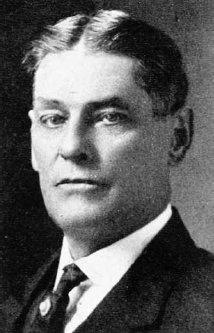
Next page
